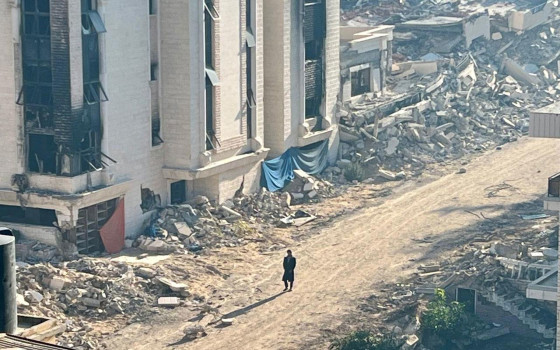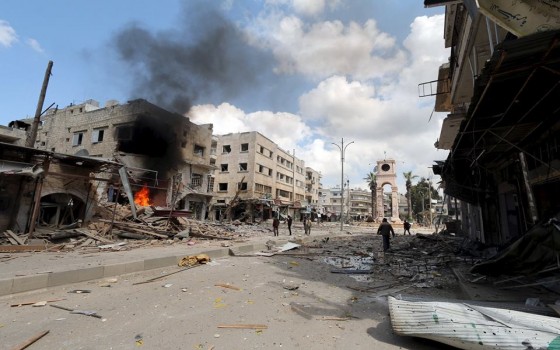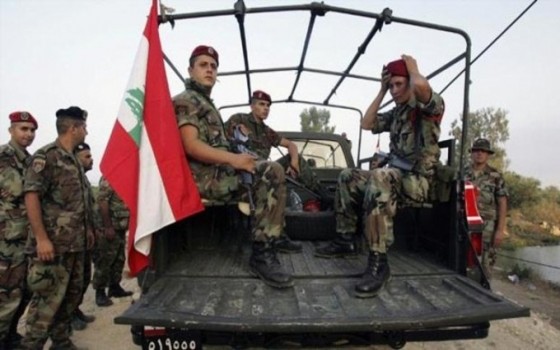
UN agencies: Gaza has become a cemetery and it seems that all roads lead to death

- Europe and Arabs
- Saturday , 21 December 2024 9:59 AM GMT
Amman - Gaza: Europe and the Arabs
The United Nations Children's Fund (UNICEF) said that "the war on children in Gaza" is a stark reminder of the world's collective responsibility to do everything possible to end their suffering, stressing that "a generation of children is bearing the brunt of the brutal violation of their rights and the destruction of their future."
This was stated by Rosalia Poulin, UNICEF's chief communications officer in Gaza, who said that the children of the Strip are "sick, tired and traumatized," while hunger and malnutrition threaten their lives.
She said: "Gaza is one of the saddest places for us as humanitarian workers, because every small effort to save a child's life is lost due to the violent destruction. For more than 14 months, children have been on the brink of this nightmare, with more than 14,500 children reported killed, and thousands more injured." “My eyes beat me to heaven”
Speaking to reporters in Geneva from the Jordanian capital Amman on Friday, Pauline described meeting a five-year-old boy called Saad, who suffered life-changing injuries in a bombing of his home that left him blind.
“He said to me, ‘My eyes beat me to heaven.’ As we were talking, a plane flew overhead, and the moment he heard the plane, he froze, screamed and grabbed his mother. To see this boy in such a state of deep panic was honestly unbearable.”
The UNICEF communications officer in Gaza said the stories she had heard “will torment me forever.” She also told reporters about another baby, Saad, whom she had met in the summer when he was seven months old and weighed just 2.7 kilograms. The baby recently died of malnutrition, a “miracle” for his mother after years of trying to conceive.
“He was born in war and left this world without a chance to live in peace,” Pauline added. “I can’t even imagine how much his parents must have suffered. It’s not just physical, it’s psychological.”
Days stolen from children
As winter descends on Gaza, Pauline said children are “cold, wet and barefoot,” with many still wearing summer clothes. She added that children are searching through the rubble for pieces of plastic to burn, and that diseases are rife in the Strip, with health services lacking and hospitals constantly under attack.
She said: “There are immediate things we can all do today to make life more bearable for these children. We can use our voices, our political capital and our diplomatic influence to push for the evacuation of seriously injured children and their parents to leave Gaza and seek life-saving medical care in East Jerusalem or elsewhere.”
She stressed that every day that passes without action “steals another day from the children of Gaza,” adding: “Every delay costs more lives. This war must haunt every one of us. The children of Gaza cannot wait.”
No protection from cold and shrapnel
UNRWA emergency officer Louise Waterridge said the weather had worsened in recent days and that pattern was expected to continue, but the agency had been forced to prioritise food over shelter assistance.
“We have supplies outside Gaza waiting to enter the Strip for six months. This is the reality for humanitarian workers here. We have to choose between people getting food or people getting shelter,” she said.
Speaking from the Nuseirat area in the central Gaza Strip, she said that with 69 per cent of buildings damaged or destroyed, people were not only facing harsh winter conditions but were also unprotected from bombs and airstrikes.
“We hear from doctors that children are getting shrapnel injuries from strikes within a kilometre of where they are because there are only tents and tarpaulins to protect them from bombs and bullets,” she added.
“What we can’t see”
Watteridge said she had spoken over the past year about what she could see, including young children missing limbs, families trapped under rubble while the UN and emergency teams were denied access to rescue them, and people searching for scraps of food in the garbage to feed their families, but today she wanted to focus on “what we can’t see.” She said the agency had been denied access to Rafah every day since it was forced to leave in May after it had been considered a humanitarian hub. “We have no idea what Rafah looks like today,” she said. “We continue to be denied access to the besieged north. Hospitals continue to come under attack, schools that shelter people continue to come under attack. Time and again, almost systematically, the UN is denied access to provide aid and support to people in the besieged north.” Describing journalists in the Strip as heroes for bringing images of the dire situation on the ground to the world, Waterridge noted that what people see in their reports and on social media is from the perspective of those who are able to flee for their lives when the strikes come.
“What we don’t see are the people who can’t flee. We don’t see the elderly. We don’t see the little children whose parents were killed in the strikes – who are left with no way to communicate what is happening. The world doesn’t see what is happening to these people. The entire community here is now a graveyard. People don’t have the luxury of even mourning their loved ones because they are just trying to survive,” she said.
All roads lead to death
The UNRWA official told reporters the story of an 80-year-old woman she met in Gaza City. The woman was being pushed in a wheelchair across a barrier between the besieged north and Gaza City by her young male relatives when they were shot dead by snipers. “She was in a wheelchair, she had no power to do anything. She couldn’t move herself. She had to watch the male members of her family being eaten by dogs in front of her. She only made it to Gaza City after another family passed through the checkpoint and helped her.”
As the year draws to a close, Waterridge recalled that more than two million people remain trapped in appalling conditions in Gaza, deprived of their basic needs. “They cannot escape, and it seems like every path you take leads to death,” she said.












No Comments Found